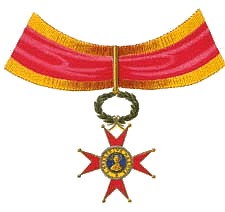Order of St. Gregory the Great
| Order of St. Gregory the Great Ordo Sancti Gregorii Magni (Latin) |
|
|---|---|

Knight Commander's cross of the Order of St. Gregory the Great (1841)
|
|
| Awarded by The Pope |
|
| Type | An honorary Order of Knighthood of the Holy See, but not necessarily of the Roman Catholic Church. |
| Motto |
Pro Deo et Principe (Latin) ("For God and Ruler") |
| Eligibility | Roman Catholic laity |
| Status | Bestowed by authority of the Pope as the monarch of the Holy See and as the temporal sovereign of the Vatican City State. |
| Sovereign | His Holiness Pope Francis, as of April 2013 |
| Grades |
|
| Former grades | Knight/Dame Grand Cross of the Second Class |
| Statistics | |
| Established | Established on 1 September 1831 |
| Precedence | |
| Next (higher) | Order of Pope Pius IX |
| Next (lower) | Order of St. Sylvester |
|
Ribbon bar of the order |
|
The Pontifical Equestrian Order of St. Gregory the Great (Latin: Ordo Sancti Gregorii Magni, Italian: Ordine di San Gregorio Magno) was established on 1 September 1831, by Pope Gregory XVI, seven months after his election to that seat by the College of Cardinals.
The Order of St. Gregory the Great is one of the five Orders of Knighthood of the Holy See. The honor is bestowed upon Roman Catholic men and women (and sometimes in rare cases to non-Catholics) in recognition of their personal service to the Holy See and to the Roman Catholic Church, through their unusual labors, their support of the Holy See, and their excellent examples set forth in their communities and their countries.
The Order of St. Gregory the Great has four "classes" in civil and military divisions:
The motto of the Order of St. Gregory the Great is Pro Deo et Principe ("For God and Ruler").
The inaugural brief states, in part, that "gentlemen of proven loyalty to the Holy See who, by reason of their nobility of birth and the renown of their deeds or the degree of their munificence, are deemed worthy to be honored by a public expression of esteem on the part of the Holy See". The end of the brief states that they must progressively maintain, by continued meritorious deed, the reputation and trust they had already inspired, and prove themselves worthy of the honor that had been conferred on them, by unswerving fidelity to God and to the sovereign Pontiff.
The awarding of the Order of St. Gregory the Great presents no particular obligations on the recipients toward the Roman Catholic Church – except for the general ones stated above.
An eight-pointed cross, the insignia of the Order, bears a representation of St. Gregory on the obverse and on the reverse the motto Pro Deo et Principe ("For God and Ruler"). The cross is suspended from a red and gold ribbon. In ecclesiastical heraldry, laymen awarded the high rank of Grand Cross can display a red and gold ribbon surrounding the shield in their personal coats of arms, but the recipients of the lower ranks place an appropriate ribbon below the shield. The difference between the civilian and military insignia is that the former group wears the cross hanging from a green crown of laurel, whereas the latter group wears the cross hanging from a trophy of arms.
...
Wikipedia
